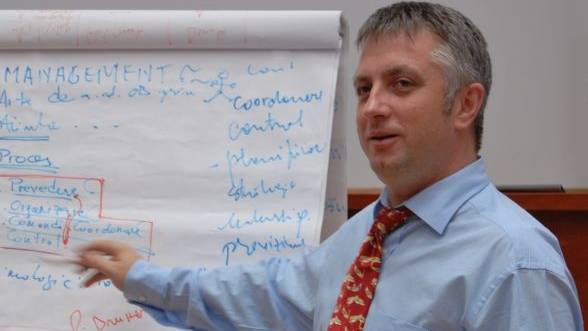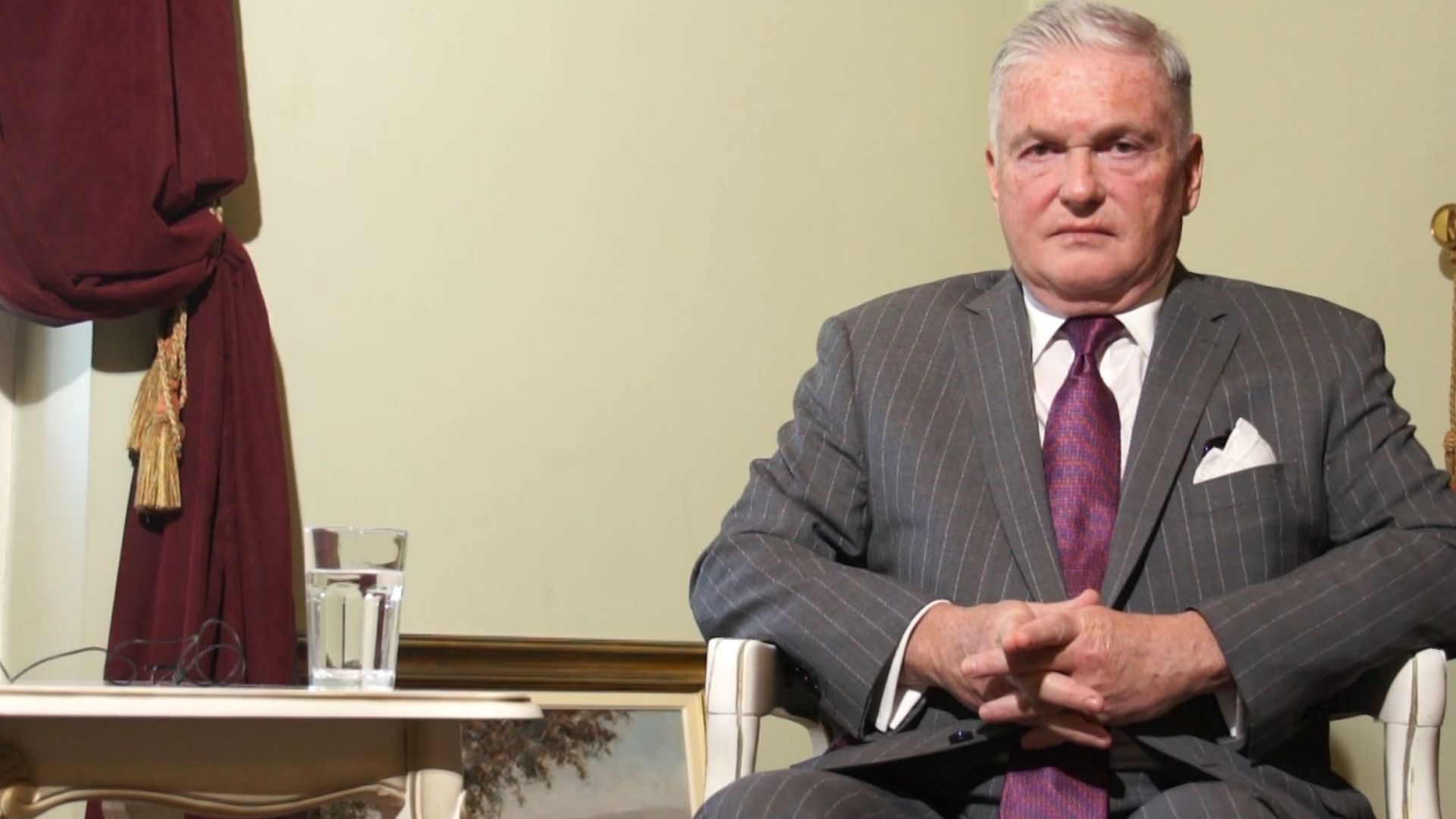Ultimele decenii au văzut o transformare a Europei occidentale nemaiîntâlnită de peste o mie de ani, de la migraţiile care au distrus Imperiul Roman de Apus. În condiţiile aservirii naţiunilor europene unor state tot mai socialiste, milioane de imigranţi extra-europeni au ajuns să trăiască în Occident, profitând de nevoia tot mai mare a acestuia de forţă de muncă. Cartiere întregi, chiar şi unele oraşe, au ajuns să arate ca în Orient sau ca în Africa, iar numărul imigranţilor o să crească şi mai mult în următorii ani. Problema nu ar fi atât de gravă dacă Occidentul nu ar manifesta atâta disconfort faţă de tradiţiile sale, dar din păcate, nu mai promovează nimic din ceea ce este propriu şi apără tot ce este diferit, cu atât mai mult dacă îi este opus.
(Notă: întrucât din punct de vedere politic, Vestul se opreşte la graniţele Uniunii, voi folosi în continuare persoana întâi plural)
Avem cel mai înalt grad de dezvoltare economică, socială şi culturală, iar armatele noastre sunt cele mai avansate din punct de vedere tehnologic. Cultura noastră este prezentă, într-o formă sau alta, în toate colţurile acestei planete – marile imperii europene şi-au lăsat amprenta pe toate continentele, influenţând, direct sau indirect, toate naţiunile lumii. Nicăieri nu există mai multă libertate şi mai mult respect pentru ceea ce înseammnă să fi om şi nicăieri nu există o dorinţă mai mare de a face bine. Cu toate derapajele ei, nici o civilizaţie din istoria umanităţii nu a dus o politică mai umană, nu a fost mai îngăduitoare faţă de străin sau mai interesată de cine este celălalt, de unde vine şi ce vrea. Suntem singurii care au creat o civilizaţie ale cărei valori se adresează tuturor şi totuşi, ne autocondamnăm drept „imperialişti”, „fascişti”, „asupritori”, „rasişti” şi „misogini”, scoţându-i pe adevăraţii imperialişti, fascişti, asupritori, rasişti şi misogini drept victime ale propriilor noastre maşinaţiuni.
V-aţi întrebat vreodată cum se face în ciuda tuturor realizărilor ei, lumea europeană este singura criticată atât de inamici, cât mai ales de proprii ei locuitori? Ce îl poate determina pe un occidental să fie atât de nemulţumit de tot ce este al lui, găsind prea puţine lucruri bune în trecut sau în prezent?
Cel care îşi pleacă urechea la discursul promovat de cei mai mulţi membri ai auto-intitulatei elite este îngrozit de ce aude: pare că nu există loc mai oribil pe pământ, mai caracterizat de nedreptate, rasism, intoleranţa religioasă, dispreţ faţă de femei, minciună; istoria noastră este cea mai violentă şi mai plină de ură. Dacă răul ar fi existat vreodata, pentru elita sinucigaşă ce ne conduce e limpede ca lumina zilei că şi-a găsit sălaşul în Europa „omului alb”.
S-ar zice că, epuizându-ne intelectual şi moral, am ajuns să prezentăm simptomele unei civilizaţii care a atins maximul de dezvoltare şi care se află în plină cădere liberă. Tehnologia occidentală se dezvoltă într-un ritm ameţitor, dar fără folos, căci sufletul nostru este mutilat. Simbolurile măreţiei occidentale, faimoasele sale universităţi, cândva centre ale unei gândiri extrem de creative, au devenit vârful de lance al luptei împotriva a ceea ce ne defineşte. De ce?
În anumite cazuri (ex. Marea Britanie, Franţa), un răspuns tentant ar fi că principala cauză este frica; avem prea mulţi străini ostili nouă, suntem laşi şi ne lipseşte tăria de a pune piciorul în prag. Până la un punct, această constatare este corectă; fără îndoială, există o anumită doză de frică, mai ales acolo unde islamismul domină, dacă nu prin număr, măcar prin potenţialul de violenţă pe care îl are, dar adevărata cauza este alta. Dincolo de frică, există ceva ce nu mai poate fi întâlnit în altă parte – un cancer, o maladie care ne distruge din interior: un soi de Selbshass, o ură de sine, adânc înrădăcinată în conştiinţa noastră. Esenţa europenităţii stârneşte reacţii adverse actualilor locuitori ai continentului european (fenomenul este întâlnit într-o formă sau alta şi la restul lumii europene – Statele Unite, Canada, Australia şi Noua Zeelandă). Vechea Europă mai trăieşte doar în cărţi şi rămâne de văzut în cât timp o vor epura şi de acolo. Aproape tot ce îi era propriu cândva este astăzi dispreţuit.
Vechea Europă credea în Dumnezeu; în Noua Europă, bisericile sunt simple muzee, Dumnezeu a murit, binele şi răul nu mai există, iar omul a fost deificat în locul lui. În „progresul” nostru continuu, mai avem puţin şi ridicăm temple raţionalismului, înţeles greşit drept antiteză a credinţei.
Vechea Europă mai respecta încă responsabilitatea; Noua Europă a infantilizat cetăţeanul, transformându-l într-un dependent.
Vechea Europă preţuia naţiunea, fiecare om îşi avea locul lui sub soare în cadrul unei comunităţi de familii, fiecare unică, fiecare importantă; în Noua Europă, naţionalismul este un simbolul al unei minţi primitive, tribale, fiind desconsiderat ca un drum către fascism, înţeles de fiecare dată drept naţional-socialism – europeanul contemporan nu poate fi decât euroentuziast şi a-naţional.
Vechea Europă avea principii; Noua Europă se călăuzeşte după un singur principiu: nu există principii, totul aflându-se sub semnul subiectivităţii şi relativismului.
Respingerea ideologiei feministe este, în sine, o dovadă a misoginismului şi a „patriarhatului” european, iar opiniile incorecte politic despre homosexualitate atrag după sine acuzaţia de homofobie şi trimiterea rapidă către patologie, urmată, desigur, de recomandarea de a-ţi ţine părerile eretice pentru sine.
Cum poate fi numită o astfel de cultură al cărei scop principal pare a fi propria înjosire? Filosoful conservator Roger Scruton i-a găsit un nume: cultura repudierii. Subcapitolul face parte din volumul Vestul şi restul, p. 67-80. (Vlad M.)
Cultura repudierii
Roger Scruton
Viziunea iluministă asupra condiţiei noastre, tradusă prin legi şi instituţii care garantează drepturile cetăţeanului, este unul dintre cele mai nobile visuri ale omului. Dar drepturile trebuie plătite prin îndatoriri, iar chemarea la datorie este eficientă numai în contextul unei loialităţi comune. Când loialitatea se erodează, simţul datoriei se erodează o dată cu ea. Dar erodarea datoriei nu e însoţită de o scădere a reclamării drepturilor. Dimpotrivă, pe măsură ce oamenii îşi neglijează îndatoritirile, ei presupun că şi alţii fac acelaşi lucru. Rezultatul este o creştere omniprezentă a cererii drepturilor. Procesul politic devine o încăierare pentru a obţine tot ce se poate din resursele comune, iar jurisdicţia este tratată ca o afacere comercială, judecata fiind mijlocul de a obţine avantaje în detrimentul concetăţeanului15.
În acelaşi timp, omul nu poate trăi doar prin drepturi. Dreptul meu este datoria ta, şi, într-o cultură a drepturilor, eu sunt în mod inevitabil conştient de faptul că mă bizui pe conştiinciozitatea altora şi pe disponibilitatea lor de a se supune legii. Oricât de necruţător mi-aş urmări propriile drepturi în dauna ta, eu ştiu că pot face acest lucru numai pentru că avem o loialitate comună şi împărtăşim aceeaşi apartenenţă. Presupunerea unei loialităţi comune este resimţită ca o sarcină morală şi ca o nevoie religioasă sau cvasireligioasă. Incapabili să susţină vechile forme de apartenenţă, oamenii le repudiază în schimb, sperând că din cenuşa negaţiei se va naşte o formă mai nouă şi mai acceptabilă de apartenenţă.
Cea mai importantă ilustrare a acestui fenomen este familia. Societăţile religioase generează familii ca un produs secundar al credinţei. S-ar părea că Dumenezeu manifestă un interes arzător pentru viaţa noastră sexuală, ceea ce nu este greu de înţeles. Deoarece a fost evident cel puţin de la marele tratat al lui Durkheim – Formele primitive ale vieţii religioase – încoace că religiile există în primul rând şi mai ales pentru că oferă o apartenenţă, într-o formă care îndeamnă oamenii să se dedice sarcinii colective a reproducerii societăţii. O comunitate religioasă este mai bine înzestrată pentru a supravieţui în orice conflict datorită coeziunii sociale, obedienţei împărtăşite şi viziunii pe termen lung, care apar toate în mod natural din disciplina credinţei. Religia dă, de asemenea, solemnitatea căsătoriei, îndeamnă părinţii să se dedice copiilor şi solidarizează generaţiile printr-o ţesătură de legăminte indestructibile.
Într-o societate seculară, familia este lipsită de acest foarte important capital moral şi de sprijin ideologic. Ea pare din ce în ce mai puţin o îndatorire bucurându-se de binecuvântarea divină şi din ce în ce mai mult o alegere omenească ce poate fi anulată. O trăsătură a conservatorismului modern a fost cinstirea familiei ca obiect de valoare intrinsecă. Nemaifiind privită ca scop secundar al credinţei, familia devine un scop în sine, producător, mai degrabă decât produs, al valorilor obşteşti. Vedem limpede această idealizare a familiei în primele lucrări teoretice ale conservatorismului modern – Filozofia dreptului a lui Hegel şi Reflecţii asupra Revoluţiei franceze a lui Burke -, ca şi în reconstitutirea monarhiilor europene în secolul al XIX-lea sub forma „Familiilor regale”, a căror domnie era validată prin senina lor viaţă de familie. Iar accentul pus pe valorile familiei rămâne astăzi un strigăt stingher al vocilor conservatoare, care ne somează să renunţăm la plăcerile noastre. Pe măsură ce loialităţile slăbesc – divorţul, promiscuitatea şi fuga generală de angajament pe termen lung – apare o nouă atitudine faţă de familie, nu de scepticism, ci de repudiere. Familia e denunţată ca izvor de asuprire sau ca instituţie patriarhală menită subordonării femeilor.
La scurt timp după ce fusese idealizată de Hegel, familia a fost satirizată de Marx şi Engels în Sfânta familie. Dar adevăratul război împotriva familiei este un produs al sfârşitului secolului XX, făcând parte ditr-un mare viraj cultural, de la susţinerea la repudierea valorilor moştenite. Wilhelm Reich, R. D. Laing, Aaron Esterson şi psihoterapeuţii radicali de aceeaşi speţă văd familia ca o povară impusă de trecut, o cale pe care părinţii îşi stânjenesc odraslele cu moştenirea unei autorităţi perimate. În viziunea lui Laing, schizofrenia apare fiindcă Sinele devine Altul prin impunerea de către părinţi a unor norme disfuncţionale. Mergând pe calea deschisă de asemenea gânditori, ca şi de Michel Foucalt prin „poveştile” lui despre sexualitate, nebunie şi medicină, feminismul radical şi-a propus să demoleze în întregime familia, demascând-o drept un instrument al dominaţiei masculine şi pledând pentru noi forme de unire „negociată” care să-i ia locul.
Rămâne un sector al societăţii solid angajat în susţinerea „valorilor familiale” şi împărţirii rolurilor care asigură trăinicia familiilor. Dar acest sector al societăţii nu are nici un cuvânt real în formarea opiniei publice. Mesajul lansat de media, şcoală şi elite formatoare de opinie este feminist, antipatriarhal şi opus tradiţionalelor interdicţii sexuale, precum cele legate de avort, homosexualitate şi sexul în afara căsătoriei. Încă mai important, cultura elitei a suferit un fel de „inversiune morală”, pentru a folosi expresia lui Michael Polanyi16. Ceea ce era permis devine interzis, iar pledoaria pentru alternative generează un război împotriva vechii ortodoxii. Departe de a se bucura de condiţia unei alternative legitime la diversele poziţii „transgresive” proslăvite de elite, familia este automat respinsă, fiind considerată o formă de oprimare.
O structură veche a apartenenţei sociale s-a dovedit a fi imposibil de apărat şi prin repudierea ei ne bucurăm de o nouă formă de apartenenţă care ne face tovarăşi de luptă împotriva trecutului. Apartenenţa oferită în acest fel – proaspătă, aducând cu sine o nouă tinereţe, o propunere de curăţire şi eliberare a lumii – este un apel voalat pentru o experienţă socială mai degrabă religioasă decât politică. Ca şi marxismul, feminismul se pretinde o mişcare politică. De fapt este o mişcare împotriva politicii, întocmai cum a fost şi marxismul. Feminismul caută să înlocuiască sau să reaşeze esenţa experienţei apartenenţei socaiel, având ca atare ambiţiile unei credinţe monoteiste ce oferă un răspuns feminist oricărei probleme morale sau sociale, o versiune feministă asupra lumii umane, o teorie feministă a universului şi chiar o interpretare feministă a Dumnezeului- femeie. Feminismul alungă ereticii şi semicredincioşii din rândurile sale cu un zel care reprezintă cealaltă faţă a căldurii cu care îşi îmbrăţişează supuşii şi dreptcredincioşii, şi se ridică implacabil împotriva vechii orânduiri, într-un fel asemănător celui în care protestantismul s-a ridicat împotriva bisericii romano-catolice în timpul Renaşterii.
În acelaşi timp, feminismul – cel puţin în versiunea sa academică – se consideră moştenitor al Iluminismului, continuând urmărirea imparţială a adevărului până la răsturnarea temeiurilor pe care a fost clădită societatea tradiţională. Ca şi marxismul, feminismul dă impresia că ne înfăţişează o lume lipsită de măşti ideologice şi de camuflaj. Cu toate acestea, mişcarea feministă are şi eu un scop ideologic. Zelul cu care respinge nu este îndreptat, de regulă, împotriva Islamului sau culturilor răsăritene, ci împotriva Vestului, iar mesajul său este „jos cu noi”.
Acesta este un adevăr general privitor la corectitudinea politică (political correctness), în cadrul căreia feminismul este o componentă obligatorie. În timp ce ne recomandă să fim pe cât putem de „inclusivi”, să nu facem discriminări nici cu gândul, cuvântul sau fapta împotriva minorităţilor etnice, sexuale sau comportamentale, corectitudinea politică încurajează defăimarea lucrurilor pe care le simţim îndeosebi ca fiind ale noastre. Directorul general al BBC-ului a condamnat de curând această organizaţie şi programele sale ca fiind insuportabil de aservite mentalităţii albilor şi clasei de mijloc. Universitarii zâmbesc ironic în faţa cursurilor universităţii organizate de „Dead White European Males”* („Bărbaţii Albi Europeni Morţi”). O instituţie britanică de bineface care se ocupă de relaţiile rasiale a condamnat afirmarea unei identităţi naţionale „britanice” ca fiind rasistă. Şi aşa mai departe. Toate aceste declaraţii abuzive se conformează codului corectitudinii politice. Pentru că deşi ele implică o condamnare deliberată a discriminării oamenilor pe temeiuri de clasă, rasă, sex sau culoare, scopul lor nu este de a-l include pe Celălalt, ci de a ne condamna pe Noi. Mărinimoasa pledoarie pentru includere maschează prea puţin mărinimoasa dorinţă de a-l exclude pe cel care excludea anterior; cu alte cuvinte, de a repudia moştenirea culturală care ne defineşte ca pe ceva diferit de rest.
Mentalitatea acelui „jos cu noi!” se dedică smulgerii din rădăcini a loialităţilor noastre vechi, care nu mai pot fi susţinute. Iar atunci când mor vechile loialităţi, moare şi vechea formă de apartenenţă. Prin aceasta Iluminismul, care pară să ducă de bunăvoie la o cultură a repudierii, devine o ameninţare pentru Iluminism, căci el subminează certitudinile pe care se întemiează statutul de cetăţean. Acesta este lucrul care se petrece acum în viaţa intelectuală a Vestului.
În locul accentului pus pe raţiune ca fiind calea spre adevărul obiectiv, a apărut „privirea din afară”, prin care întreaga noastră tradiţie de educaţie este pusă la îndoială, pregătindu-se în acest fel respingerea ei. Vechiul apel la raţiune este privit doar ca un apel la valorile occidentale care au făcut din cultură o lozincă în numele căruia s-au emis pretenţii pentru obiectivitate pe care nici o cultură n-ar putea vreodată să o aibă. Căci culturile oferă afiliere, nu adevăr, şi ca atare nu pot permite pretenţii exclusive asupra celui care le priveşte din afara teritoriului lor. Mai mult, revendicându-şi raţiunea ca sursă, cultura apuseană şi-a ascuns de fapt etnocentrismul (potrivit modei criticii „postmoderniste”), prezentând felul occidental de a gândi ca şi cum ar avea o forţă universală. În consecinţă, raţiunea este o minciună şi, demascând minciuna, dezvăluim oprimarea din inima civilizaţiei apusene.
Detronarea raţiunii merge mână în mână cu o ostilitate faţă de crediţa în adevărul obiectiv. Specialiştii ale căror lucrări sunt cel mai des citate când este demascată „cultura occidentală” sunt cu toţii adversari ai acestei credinţe. Şi, asemenea legilor logicii, credinţa în adevăr este imposibil de apărat fără a presupune în acelaşi timp că el există. Apărătorii vechiului program de învăţământ şi a disciplinei exprimate de el se confruntă cu un soi de impas intelectual şi urmăresc în tăcere cum noile autorităţi antiautoritare îşi colonizează peticul de pământ.
Nietzsche este un favorit, din moment ce a afirmat explicit că „nu există adevăruri, ci doar interpretări”. Acum, fie ce a zis Nietzsche este adevărat – în care caz nu e adevărat, deoarece nu există adevăruri – fie este fals. Dar acest răspuns apare ca o respingere doar din perspectiva Iluminismului. Noul program de învăţământ acţionează în scopul marginalizării respingerii, tot aşa cum marginalizaează adevărul. Aşa se explică atracţia suscitată de acei gânditori recenţi – Michel Foucalt, Jacques Derrida şi Richard Rorty – care-şi datorează poziţia intelectuală eminentă nu argumentulor lor, ci rolului lor de a conferi autoritate respingerii autorăţii şi angajamentului lor absolut în afirmarea imposibilităţii angajamentelor asbsolute. La fiecare dintre ei poate fi găsită ideea că adevărul, obiectivitatea, valorea sau semnificaţia sunt himerice, şi că tot ce putem avea, şi tot ce ne trebuie, este adăpostul călduţ al propriilor noastre opinii17. Este prin urmare zadarnică discuţia în contradictoriu cu noii specialişti. Nici un argument, oricât de raţional, nu se poate opune puternicei „dorinţe de a crede” care-i cucereşete pe cititorii lor obişnuiţi. La urma urmei, un argument raţional ia drept exact ceea ce ei „pun la îndoială”, adică posibilitatea existenţei unui argument raţional. Fiecare dintre ei îşi datorează reputaţia unui soi de credinţă religioasă: credinţă în relativitatea tuturor părerilor, inclusiv a acesteia. Căci aceasta este credinţa pe care se întemeiează o nouă formă de apartenenţă – o negare la persoana întâi plural.
Iluminismul aduce un omagiu explicit valorilor universale şi naturii general umane. Arta Iluminismului a cuprins alte locuri, alte timpuri şi alte culturi, într-o încercare eroică de a apăra o viziune a omului liber şi autocreat. Această viziune a inspirat şi a fost inspirată de vechiul program de învăţământ şi punerea ei sub semnul întrebării a fost prima preocupare a universitarilor postmoderni. Aceasta explică popularitea unui gânditor relativist – Edward Said, a cărui uimitoare carte Orientalism a arătat cum poat fi respins Iluminismul ca formă de imperialism cultural.18 Said susţine că Orientul apare în arta şi literatura occidetanlă ca ceva exotic, ireal, teatral, şi ca atare lipsi de temei. Departe de a reprezenta o recunoaştere generoasă a altor culturi, arta orientalistă a Europei iluministe (inclusiv Nathan cel Înţelept a lui Lessing) este un paravan care ascunde acele culturi. În timp ce Orientul ar fi putut reprezenta o alternativă autentitică la Iluminismul occidental, el a fost reconstitutit ca o poleială decorativă lipită peste proiectul imperial apusean.
Sub acest aspect, vechiul program de învăţământ a Iluminismului este de fapt monocultural, dedicat perpetuării viziunii civilizaţiei apusene despre superioritatea sa aparentă în raport cu rivalele sale. Este de asemenea produsul „Bărbaţilor Albi Europeni Morţi” care şi-au pierdut între timp autoritatea. Iar arogarea unei perspective raţionale universale, care ar avantaja studierea umanităţii în ansamblul ei, nu este altceva decât o raţionalizare a pretenţiilor imperialiste ale Apusului. Dimpotrivă, noi ce care locuim în ambianţa amorfă şi multiculturală a oraşului postmodern trebuie să ne deschidem inimile şi minţile spre toate culturile şi să nu ne fixăm asupra nici uneia. Rezultatul inevitabil este relativismul: recunoaşterea că nici unei culturi nu trebuie să-i acordăm o atenţie privilegiată şi că nici o cultură nu poate fi judecată sau respinsă din afara ei.
Dar avem încă o dată de-a face cu un paradox. Pentru că cei care pledează în favoarea acestei abordări multiculturale sunt de regulă criticii severi ai culturii apusene. În timp ce ne îndeamnă să judecăm alte culturi în termenii lor proprii, Said ne pretinde să judecăm cultura occidentală dintr-o perspectivă exterioară – s-o opunem unor alternative şi s-o etichetăm defavorabil ca etnocentrică. În cazul lui Said, paradoxul se adânceşte, deoarece el are cunoştinţe temeinice de muzică şi etalează în scrierile lui de muzicologie întocmai acel universalism uman şi iluminist care a făcut din muzica tonală simbolul culturii occidentale.
Mai mult, criticile aduse culturii apusene sunt de fapt confirmarea pretenţiilor acesteia de a câştiga valoarea lumii. Interesul nostru faţă de egalitatea raselor şi sexelor se datorează Iluminismului şi moralei sale universaliste. Concepţia iluministă despre om ne-a făcut să avem pretenţii atât de mari de la arta şi literatura occidentală – mai mari decât am fi vut vreodată de la arta şi liberatura din Java, Borneo sau China. Tocmai încercarea de a îmbrăţişa alte culturi face din arta occidentală o victimă a atacurilor lui Said – încercare fără precedent în arta tradiţională a Arabiei, Indiei ori Africii. Chiar şi în perioada sa cea mai grandioasă, literatura arabă a fost impenetrabilă faţă de influenţele lumii creştine. Într-adevăr, gânditorii Falasifa** au învăţat cît au putut din filozofia greacă; dar numai pentru că au considerat că filozofia greacă adaugă o dimensiune metafizică crucială la mesajul Coranului. În timp ce Marguerite de Navarre şi Boccaccio descopereau şi repovesteau basmele Arabiei, în timp ce Langland şi Chaucer răspuneau în versurile lor puţinului pe care-l înţelegeau din Averroes şi Avicenna, gândirea şi literatura arabă îşi urmau calea ca şi cum nimic important n-ar fi putut să se întâmple în afara Dar al-Islam-ului.
De altfel, numai o perspectivă foarte îngustă asupra tradiţiei noastre artistice ar putea ignora o abordare multiculturală care întrece prin puterea sa de imaginaţie tot ce ne învaţă profesorii noştri. Cultura noastră invocă o comunitate istorică de simţire cinstind totodată valori umane universale. Ea are rădăcini în experienţa creştină, dar extrage din acest izbor o bogăţie de sentimente omeneşti pe care le împrăştie imparţial peste lumi închipuite. De la Orlando furioso şi Don Quijote la Don Juan-ul lui Byron, de la Popeea lui Monteverdi la Hiawatha lui Longfellow, de la Povestea de iarnă la Madama Butterfly şi Cântecul pământului, cultura noastră s-a venturat permanent într-un teritoriu spiritual care nu există pe harta creştină. Aceste mari realizări estetice merg mână în mână cu domnia seculară a legii, jurisdicţia teritorială şi aspiraţia către calitatea de căteţean ca produse ale loialităţilor ce permit bărbaţilor şi femeilor să se identifice în imaginaţie cu cei din „alte locuri”.
Există şi alte semne care indică fărâmiţarea Iluminismului o dată cu apariţia culturii repudierii. Aşa cum se observă deseori, spiritul de informare liberă dispare astăzi din şcolile şi universităţile occidentale. Cărţile sunt introduse sau radiate din programele de învăţământ pe motiv de corectitudine politică; codurile de exprimare şi serviciile de consiliere fac ordine în limbajul şi comportamentul studenţilor şi profesorilor; multe cursuri au în vedere mai curând conformitatea ideologică decât dezvoltarea unui spirit de informare raţională, iar studenţii sunt adesea pedepsiţi pentru a fi tras o concluzie eretică privitoare la principalele chestiuni litigioase ale zilei. În domeniil sensibile, cum este studiul rasei şi sexului, cenzura vizează direct nu numai pe studenţi, dar şi pe oricare dintre profesori, oricât de imparţiali sau scrupulos, care ajunge la concluzii „greşite”. „Cursurile de conştientizare a problemei rasismului” sunt deseori folosite în campusul american în chip de „corective” – adică pedepse – pentru cei al căror comportament „deviant” necesită reeducare. Cultura repudierii ne reaminteşte aşadar că informarea liberă nu este un exerciţiu firesc al miniţii omeneşti, fiind atrăgătoare doar dacă este privită ca o cale spre apartenenţa socială. Atunci când experienţa apartenenţei nu mai poate fi obţinută pe această cale, rolul ei este preluat de un nou tip de informare, explicit îndreptată spre un obiectiv social promis.
O singură temă străbate ştiinţele umaniste, aşa cum sunt ele predate de regulă în universităţile americane şi europene: nelegitimitatea civilizaţiei occidentale şi natura artificială a a deosebirilor pe care a fost întemeiată. Toate deosebirile sunt „culturale”, aşadar „construite”, aşadar „ideologice”, în sensul definit de Marx, fabricate de clasa stăpânitoare pentru a le servi interesele şi a le sprijini puterea. Civilizaţia apuseană este pur şi simplu mărturia acestui proces de asuprire, iar scopul principal al studiului ei este desfiinţarea pretenţiilor pe care le ridică asupra apartenenţei noastre. Acesta este miezul concepţiei pe care trebuie să o înghită o mulţime de studenţi în ştiinţele umaniste, de preferinţă înainte ca ei să capete disciplina intelectuală de a o pune la îndoială sau de a o confrunta cu literatura care îi demonstrează netemeinicia.
Altfel spus, Iluminismul a dislocat teologia din centrul programelor de studiu pentru a o înlocui cu căutarea dezinteresată a adevărului. În foarte scurt timp însă, constatăm că universitatea este dominată de un alt gen de teologie – o teologie atee, desigur, dar nu mai puţin insistentă în privinţa supunerii necondiţionate faţă de doctrină, şi nu mai puţin înfocată în urmărirea ereticilor, scepticilor şi demistificatorilor. Evident, oamenii nu mai sunt arşi pe rug pentru convingerile lor; ei pur şi simplu nu mai caută slujbe sau, dacă sunt studenţi, sunt trântiţi la examene.
Aristotel a spus că toate fiinţele umane doresc să cunoască, dar n-a precizat că oamenii trebuie să se convingă că nu e primejdioasă cunoaşterea. Oamenii întorc spatele adevărurilor incomode şi ridică ziduri pentru a le ascunde. E greu să construieşti un zid de unul singur; dar alăturându-te altora şi ocrotiţi de o instituţie puternică, poţi participa la voioasa construcţie a minciunii, adăugând meterezelor ei propria ta cărămidă de platitudini tari ca piatra. Scopul nu este de a minţi, ci de a crea o doctrină publică acceptabilă. Iar o doctrină publică este acceptabilă dacă oferă o temelie pentru o comunitate umană stabilă şi sigură în interior. Pe scurt, marile schimbări din viaţa culturală a societăţii apusene îşi au originea în căutarea unei apartenenţe printre oameni care nu mai sunt atraşi de vechile loialităţi.
In locul vechilor convingeri ale unei civilizaţii întemeiate pe devoţiune, judecată şi loialitate istorică, tineretul primeşte convingerile noi ale unei societăţi bazate pe egalitate şi includere şi află că judecarea altor stiluri de viaţă este o crimă. Dacă obiectivul ar fi fost doar de a substitui un sistem de convingeri altui sistem, ar fi putut avea loc o dezbatere naţională. Dar obiectivul este de a substitui o comunitate; altei comunităţi. Acest proiect este şi unul negativ – de a reteza legăturile tineretului cu loialităţile istorice care şi-au pierdut dinamismul moral şi religios. Recomandarea de „a nu judeca” alte culturi merge mână în mână cu o aprigă denunţare a culturii care ar fi putut fi proprie cuiva – lucru pe care l-am observat în mod repetat la elitele formatoare de opinie de la 11 septembrie încoace. Din nefericire totuşi, o comunitate întemeiată pe repudiere nu poate exista. Asaltul împotriva vechii moşteniri culturale nu duce la o nouă formă de apartenenţă, ci doar la un fel de alienare.
Poetul Robert Bly susţine că am intrat într-o „societate fraternă” în care relaţiile cu părinţii îşi pierd orice semnificaţie printre privirile piezişe aruncate spre cei de o vârstă şi de o seamă19. Această imagine spune ceva, dar nu este un diagnostic. De ce există această societate? De ce există o „cultură a tinereţii” şi de ce această cultură se defineşte negativ, în opoziţie cu loialităţile şi pietăţile păriniţilor? Răspunsul se află, desigur, în deficitul religios crescând din societăţile moderne – dispariţia ritualurilor de trecere şi a formelor de supunere care asigură tranziţia la o stare superioară de apartenenţă, la sfârşitul drumului lung şi anevoios al adolescenţei20. Când se evaporează credinţa religioasă, când adulţii încetează să iniţieze tinerii în cultura naţională, când loialităţile nu se mai întind peste generaţii sau nu se mai definesc în termeni teritoriali, atunci societatea de străini ţinuţi laolaltă prin cetăţenie este inevitabil ameninţată. Tineretul se confruntă cu un vid moral. Fie se îndreaptă către o formă nouă de loialitate, ca membrii al-Muhajiroun-ului, fie şterg cu buretele toate cerinţele societăţii, într-o destrămare colectivă a voinţei de a moşteni – o destrămare care este în acelaşi timp cauza şi efectul stilului de viaţă sex-şi-drog al adolescentului modern.
Este tentantă asemuirea omenirii cu o turmă care cutreieră o vâlcea posomorâtă, în care mirosul plăcut al vieţii colective oferă un leac împotriva spaimelor. Din când în când turma ajunge învârfuil unui deal şi este dintr-odată scăldată în razele soarelui. Câte o adiere răcoroasă împrăştie mirosul colectiv, iar pentru un timp devine vizibilă adevărata natură a omenirii. Câţiva indivizi încearcă să rămână pe culmi, bucurându-se de lumină şi de cunoaştere. Dar ceilalţi sunt tulburaţi de adiere şi turma o ia din loc, trăgându-i pe toţi la vale în întuneric.
Aceasta este situaţia în care ne aflăm. Suntem produse ale Iluminismului, trăind declinul formei de apartenenţă de care depinde Iluminismul şi pradă superstiţiilor ce se ridică pe ruinele ortodoxiilor noastre. În acelaşi timp, ne bucurăm de forţe tehnologice nemaiîntâlnite care impun o accelerare constantă a contactelor şi comerţului de-a lungul şi latul globului. Intră în legătură oameni care nu au nici o posibilitate reală de a se înţelege unii pe alţii, iar spectacolul libertăţii şi prosperităţii occidentale, mergând mână în mână cu decadenţa şi fărâmiţarea loialităţilor apusene, naşte în cei ce invidiază primul aspect şi-l dispreţuiesc pe celălalt dorinţa clocotitoare de a pedepsi.
* Expresie peiorativă (folosită în special în Statele Unite) desemnând pe omul alb de origine europeană care domină viaţa culturală.(n.t)
** Autorii musulmani influenţaţo de filozofia greacă(de la falsafa, cuvântul arab derivat din grecescul philosophia). (N.t)
15. A se vedea Walter K. Olson, The Litigation Explosion: What happened when American Unleashed the Lawsuit? (New York: Truman Talley Books-Dutton, 1991)
16. Michael Polanyi, Personal Knowledge: Towards a Post-Critical Philosophy ( Londra: Routledge, 1958), pp. 231-235
17. Am încercat să răspunând lui Foucalt şi Derrida în An Intelligent Person’s Guide to Modern Culture (South Band, Ind.: St. Augustine’s Press, 2000)
18. Edward Said, Orientalism (New York, Pantheon, 1978).
19. Robert Bly, The Sibling Society (Londra: Persus, 1996).
20. A se vedea perspectiva mea asupra culturii tineretului în An Intelligent Person’s Guide to Modern Culture.











![marius-bostan-foto[1] marius-bostan-foto[1]](https://inliniedreapta.net/wp-content/uploads/elementor/thumbs/marius-bostan-foto1-qt9ywoo2b2lgv37b76h9qr5yo6db5vwzoxbuvd4e6o.jpg)












10 Comments
Partizanu
13 July 2009O mica nota :
Roger Scruton si-a format conceptiile ultra-conservatoare la Jesus College, si a scris o carticica in care ataca dur principiul „egalitatii sanselor” si promoveaza „ierarhizarea pe principii naturale” a societatii (este vorba de cartea The Meaning of Conservatism in care ataca influentele liberale tot mai vizibile intre conservatori – e o lectura de baza in retea, nu?).
In numele lui Isus omul ataca dur si actuala cultura pe care o vede ca fiind prea liberala, cu fraze de genul „Când se evaporează credinţa religioasă, când adulţii încetează să iniţieze tinerii în cultura naţională,(…)o destrămare care este în acelaşi timp cauza şi efectul stilului de viaţă sex-şi-drog al adolescentului modern.” Amin!
Imperialistu'
13 July 2009O sa incerc sa dau de carte, Partizanu, ceea ce nu stiu cat de usor imi va fi, tinand cont ca probabil voi fi nevoit sa o comand de pe internet, dar din ce am citit pana acum de Scruton, ma tem ca eticheta de „ultraconservator” nu i se potriveste. Omul e conservator, clar, dar ultra, in nici un caz. Totusi, apara Iluminismul. ???? Ar fi fost ultraconservator daca se ralia cu totul vechilor reactionari, ceea ce nu este cazul. Ierarhizarea pe principii naturale imi suna a meritocratie, deci nu mi se pare defel absurd; in ceea ce priveste egalitatea sanselor, trebuie sa vad despre ce e vorba.
Serios acum, chiar nu crezi ca actuala cultura are probleme? Lasa-l pe Isus un pic si incearca sa priveste in ansamblu. Nu ti se pare ca multe nu mai functioneaza cum trebuie?
Turnofftheglory
13 July 2009Eterna întoarcere (T. Baconsky)
Partizanu
13 July 2009Problema vine din faptul ca actuala cultura nu mai se naste ca o negatie a realitatii existente, nu mai are o functie principala de critica ci a devenit cultura integrata, pozitiva. Adica culturica de confetti sau cultura de consum. Cultura trebuie sa contina ceva subversiv (vezi Ray Bradbury – Fahrenheit 451 sau Madame Bovary -Flaubert, Jack Kerouac etc). Vei vedea ca in cultura americana atat in muzica cat si in film societatea este prezentata ca un lucru in sine, nesupus evolutiei, cel mult putem sa radem de cliseele acestei societati insa nu putem sa o reanalizam ca sistem (vezi celebrele seriale care fac haz de necaz precum Familia Bundy sau Seinfeld). Arta avangardista respinge forma de cultura traditionala, in speranta de a rupe astfel eticheta de cultura oficiala anuleaza automat orice critica acceptata si reia critica exact in punctele nepermise. Marx de exemplu nu mai contine nimic subversiv in Vest- il gasesti printre alte carti in supermarket. Este o literatura castrata. E nevoie de ceva care sa socheze, discutand din punt de vedere artistic, sa erupa din cotidian catre o lume transcedentala (vezi Calauza de Tarkovsky). Este nevoie de carti si filme pe care sistemul sa nu le accepte, sa le catalogheze drept subversive, imorale (evident conform moralei oficiale). Muzica rock de exemplu era un curent initial autonom care ulterior a devenit administrat, a capatat un caracter organizat si sistemul il foloseste in scopul de supapa de presiune. Omul trebuie sa aiba un spatiu intim, rupt de cotidian care sa ii permita sa analizeze , sa gandeasca, fiindca atunci cand te intorci obosit de la serviciu, din imperiul „problemelor reale”, deschiderea ta catre acest tip de analiza, catre lectura este minima. Ti se pare inutil, imatur. Cultura de consum face ridicola orice incercare de a depasi cadrul culturii admise. E mai mult de discutat aici, poate voi face un post pe blogul meu mai elaborat…
costin
13 July 2009Partizanu, interesant ce spui. O sa incerc sa iti raspund maine, acum e tirziu si am fost deja doborit de „problemele reale”. Daca faci un post mai elaborat despre ce spuneai aici, sa ne dai de stire.
emil
13 July 2009Partizanu, ca toti socialistii, te legi de mesager… mesajul il ignori. Chiar si asa, stii cine a mai fost un „ultraconservator” educat de iezuiti? Descartes… iezuitii astia au avut in secolele 17 si 18 cele mai buni scoli din Europa, mai ales in „hard sciences”… stateau cam prost cu rock’n’rollu, ce-i drept. Ultraconservatori, ce mai….
emil
13 July 2009Esti tinar, l-ai descoperit pe Marcuse si a sosit si rindul tau sa-i rumegi ideile. Pedaleaza inapoi pe firul marxismului cultural si studiaza-i pe Gramsci si Kovacs. Cind vei avea o perspectiva istorica vei intelege mai bine „culturica de confetti” a lui Marcuse. In acelasi timp, nu care cumva sa pui mina pe carti cum ar fi The Closing of the American Mind, Liberal Fascism sau Radical Son: A Generational Odyssey. Sint prea critice la adresa mostenirii lasate de Gramsci, Kovacs, Marcuse si, inaintea lor, de Miscarea Progresista. Vorba ta, nu e o critica preocupata de „negarea realitatii”, ci mai degraba de recuperarea acesteia. Super-ultra-conservator.
costin
13 July 2009Un articol foarte interesant de la Tiberiu Florea, despre aceasi ‘cultura a repudierii’, aparut pe Wall Street Journal si scris de CHARLES MURRAY, care merita citit cap-coada. Autorul incheie intr-o nota totusi optimista.
Europe Syndrome
Europe Syndrome
neinfectat de comunism
13 July 2009daca nu ne apucam de facu copii, ne vom conceti la islam cu totii in 50 de ani
Imperialistu'
13 July 2009partizanu, eu cred ca problema este alta: stanga a reusit sa distruga vechea ordine, dar nu a fost capabila sa puna ceva in loc. Nici nu avea ce. Intrucat nu a putut aduce nimic in locul vechii lumi, victoria ei s-a dovedit a fi o capcana.
A luptat impotriva familiei, iar acum nu stie cum sa o scoata la capat cu problemele pe care le aduce cu sine disolutia „celulei societatii”.
A dispretuit morala religioasa si si-a concentrat eforturile pe eliminarea influentei bisericilor, iar acum nu stie de ce omul se comporta mai mult ca un animal.
Societatea de consum vine in intampinarea nevoilor primitive ale omului: ofera paine si circ, distractie si satisfacere a celor mai intunecate dorinte, iar parintele ei spiritual, stanga, este revoltata si indignata. Imi pare rau, dar am ajuns aici din cauza ei si nu pot sa zic ca sunt prea incantat de ipocrizia asta.
Inainte a facut cariera pe critica societatii capitaliste, acum face cariera pe critica societatii de consum, la a carui nastere a participat cu toata puterea ei… Unde e asumarea responsabilitatii?
costin > Fain articol a mai gasit Tiberiu. Super!
neinfectat de comunism > E o parte importanta a crizei, unii zic chiar ca e cea mai importanta… si ca suntem cam fara scapare. Istoric vorbind, se pare ca nu exista comunitati care sa fi atins vreodata „spirala mortii” si sa fi iesit din ea. Totusi, trebuie sa gasim o solutie si pentru celelalte aspecte: acei copii trebuie sa creada in ceva. Cumva, ei trebuie sa fie mai cu picioarele pe pamant decat generatiile noastre, altfel, nu avem nici o sansa.